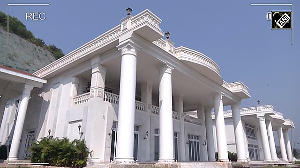If the rumour mills of Delhi have it right, the long awaited Cabinet shuffle is just around the corner, a matter of mere days, possibly even fewer than a hundred hours. This time, so Congressmen claim, there will be a clear sense of purpose behind this exercise, namely 'Save the image of the prime minister'.
This government -- 'UPA-2' in the jargon of Delhi -- has been so soiled by scandal and so lacklustre in its crafting of policy that it gives the impression that it is at the end of a five year term. In reality, it is not even two years since it was elected with a very generous mandate. But anyone that thought that the new ministry would strike out in bold new directions now stands sadly disillusioned.
The flood tides of disappointment and disgust now beat at the prime minister's door. Between inflation and scandal Dr Manmohan Singh's image has taken a beating, something that I would never have thought possibly in the magical days of his triumph in May 2009.
Some of this is, perhaps, a trifle unfair. The prime minister of India is not responsible for the heavy rains that plagued the country in 2010, nor for the rising prices of commodities -- petroleum in particular -- that are now a global concern. But if the Congress leapt at the chance to lavish praise upon Dr Singh for the liberalisation of the 1990s -- those too were not at his initiative -- he must now also carry the can in troubled times.
And truth be told there is some rationale behind the thinking that the country is suffering from a measure of economic mismanagement. Rummaging through my own files I find that I started writing about potential food-related crises as far back as 2007 (in the aftermath of a drought hitting Australia, one of the world's great wheat exporters). But it is as if the Union government is simply not concerned.
In January 2009 Punjab's food minister, Adesh Pratap Singh, wrote to Delhi, warning it of a crisis in the making, and asking for the creation of 'Long Term Storage Capacity'. The letter, warning of inadequate facilities to keep grain, was moved from the prime minister's office to the Union agriculture ministry to the Food Corporation of India.
Punjab insisted that grains could not be stored adequately in the existing facilities beyond six months, after which it would spoil; the Food Corporation of India said grains could be stored safely for up to two years.
Punjab's point -- underlined by successive Congress as well as Akali Dal-BJP ministries -- is that while the state can grow food it cannot also be asked to build the facilities to store all that it grows.
The problems become graver when a panic-struck Delhi decides to ban exports in an effort to hold prices elsewhere in India. The wheat then wastes away, which in turn gives the Food Corporation of India the perfect opportunity to say it cannot possibly pick it up.
Suffice it to say that by October 2010 as much as 55,000 metric tonnes of wheat had literally rotted away on the road. This is negligence on a gigantic scale, and somebody has to answer for the waste.
I mention this because it has become part of a pattern for the United Progressive Alliance ministry. Whether it is wheat, or legumes, or vegetables, there has been little or no effort to anticipate and prepare for a crisis.
This is how it works in Delhi. Step One: Wait for a shortage to develop. Step Two: Run around squawking until the deafest trader on the global markets has had the message drummed into his ears. Step Three: Engage in panic buying from abroad at suitably inflated prices.
Suffice it to say that this idiocy has left us at the mercy of even flood-devastated Pakistan, whose government cannily banned exports of onions to India until a 'satisfactory' price could be worked out. Can humiliation go any farther?
Granted no minister could stop the bad weather that hit us in 2010, but surely the Government of India could have started laying by a stock of essential items when the rains did not stop at the usual time. And done so quietly before the global markets smelt India's panic!
This is economic mismanagement, going back over a period of several years, and our 'economist prime minister' must answer for it. (Along, of course, with his finance minister, his agriculture minister, and such other colleagues.)
Of course, it is open to question whether the Union agriculture ministry is amenable to direction from the Prime Minister's Office. Or, come to that, whether any other ministry would do so...
It was evident from day one of the UPA government, going back all the way to May 2004 when DMK ministers struck work until the Union shipping ministry was given to the party, that poor Dr Singh would not be able to control his ministers.
That fact has been underscored by the release of the prime minister's letters to A Raja, virtually beseeching his colleague to auction spectrum rather than allot it by his own whims. Those messages make painful reading; it is as if a bureaucrat were sending recommendations rather than a prime minister giving outright directives.
Dr Manmohan Singh was never seen as a charismatic leader, but he supposedly had two compensating virtues. The first was the image of an efficient technocrat, an electoral virtue when economic development becomes a popular demand. The second was that he could present a corruption-free face of governance.
Neither has worked out as the Congress planned. The lack of political strength has sapped the prime minister's strength when it comes to giving directions to his colleagues. And the demands of coalition politics has meant that some ministers cling on to the point where people question whether the prime minister is not shielding them.
The prime minister and the Congress president have their work cut out for them in organising a new face for the Cabinet, one that might save the prime minister's face. They need to assuage the egos of coalition partners while simultaneously finding ministerial candidates that are both clean and competent. Good luck with that!







 © 2025
© 2025